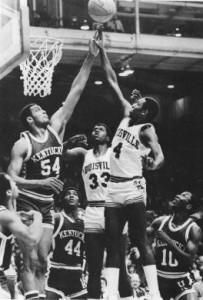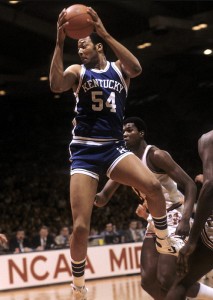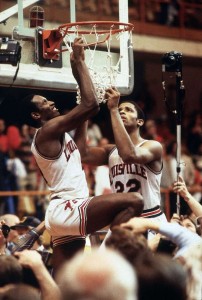Past Imperfect: Kentucky-Louisville & the Dream Game
Posted by JWeill on March 28th, 2012Past Imperfect is a series focusing on the history of the game. Every two weeks, RTC contributor Joshua Lars Weill (@AgonicaBoss|Email) highlights some piece of historical arcana that may (or may not) be relevant to today’s college basketball landscape. This week: the original Dream Game between Louisville and Kentucky.
It was bound to happen someday. Despite Kentucky’s clear antipathy toward playing in-state archrival Louisville, there was going to come a time when it was simply unavoidable. That time finally came, was forced to come actually, on March 26, 1983, in Knoxville, Tennessee, in the Mideast Regional final, with a trip to the Final Four on the line.
No knowing observer was unaware of the possibility of a Bluegrass clash when the brackets were unveiled. Just a year prior, a similar tournament setup had been quashed when Kentucky was upset by Middle Tennessee State. This time around, the Wildcats got through, finishing off Bobby Knight’s Indiana squad, while Louisville was the one in trouble. After trailing significantly, the Cardinals edged Arkansas – coached by fairly-soon-to-be Kentucky coach Eddie Sutton — on a last-second tip-in. With both teams locked in to face each other, the pregame hype and buildup began.
Media outlets immediately began to call the matchup “The Dream Game” or even, more simply, “The Game.” The players did their best to try and avoid providing any potential bulletin board material, but to limited effect. Wildcats backup forward Bret Bearup acknowledged the “thing that must not be said:” “Anybody on either side who says he hasn’t been thinking about this matchup since the tournament started is just saying what he’s supposed to say so he won’t get in trouble. I say what I’m not supposed to. I’ve been dreaming about this game. This is great stuff. ‘Course now I’m in big trouble.”
But while Louisville entered the game ranked No. 2 to Kentucky’s No. 12, at least one major participant felt that it was the mighty Kentucky program that had more to lose.
“The pressure is on Kentucky,” Louisville coach Denny Crum said in advance of the game, before needling the Big Blue Nation a little bit. “Our record is better the last 10 years. They have a chance to carve into our success.”
By tip-off, all the pregame discussions now past, everyone was ready. Tickets were at a premium and 12,489 showed up at the University of Tennessee’s Stokely Athletics Center for the game. Always eager to join a spectacle, Kentucky governor John Y. Brown wore a unique half-red, half-blue blazer to the affair.
Once the game finally got underway, it was Kentucky that broke quickly from the gate. Led by deft outside shooting by Jim Master and Derrick Hord, who each hit three early shots, the Wildcats raced to an early advantage, reaching a 23-10 lead just 10 minutes into the game. Louisville was playing tight, missing 16 of its first 20 shots.Crum’s roster was stacked, though, and the Cardinals’ talent began to show itself at last. Brothers Rodney and Scooter McCray found space underneath the basket and between them scored 12 of Louisville’s next 16 points. When Charles Jones hit a lay-up just before halftime, the UK lead was down to just seven, 37-30.
During the break, Crum told his kids that Kentucky had played as well as they could play, and that with increased pressure defensively, the Wildcats would fold. His players listened. After a couple of baskets early in the second stanza, including center Melvin Turpin’s hook shot to make the score 43-32 with 16:38 remaining, Kentucky began to fumble the ball. The Cardinals’ swarming defense – called “denial” by Coach Crum – got their athletic and skilled players running. In a two-minute blitzkrieg, Louisville forced five turnovers, outscored UK 12-2 and cut the Kentucky lead to just three, 45-42.
A few minutes later, Cardinals guard Lancaster Gordon found the net on a fast break and Louisville had its first lead at 50-49. Stunned, Kentucky wavered. The Cardinals just kept coming. Louisville stretched the lead to 58-50. But when the Cardinals got sloppy with the ball, Kentucky managed to regain its legs. Hord’s three-point play locked the two teams at 60 apiece. Just three minutes and change remained.
Another turnover gave Kentucky the ball back with 2:22 left. With no shot clock to worry about, Kentucky coach Joe B. Hall went into a stall technique, hoping to take the last shot. Louisville tried to pressure the Cats, but the stall worked. After a timeout, with just 15 seconds left on the clock, Kentucky guard Dirk Minnifield got a step on his defender and went flying toward an undefended basket. His potential game-winner looked set to fall when Louisville’s Jones came from across the lane and swatted the shot away and into the hands of Scooter McCray. McCray started the break, passing to his brother who took a few dribbles then rifled the ball to Gordon, whose banked-in jumper gave Louisville a two-point lead with now only eight seconds remaining. Hall called timeout.
The Wildcats inbounded the ball in front of the Louisville bench. Kentucky’s Master took the inbounds pass, passed it back to the inbounder and raced down the court. The Cats dribbled quickly into the frontcourt, exchanged a pass and then got Master the ball in front of the UK bench. He took one dribble to create space, jumped and with his legs splayed buried a 12 footer at the buzzer. The shot seemingly gave Kentucky new life. But the Cardinals, once burned, were not going to let that happen.
Jones won the overtime tip and immediately the aggressive Cardinals tried to swamp Kentucky with their defense and athletic advantage. Gordon hit a fadeaway, then stole a pass and scored again. Kentucky coach Hall said later, “I saw it slipping away.” Two Jones free throws and then eight straight points from guard Milt Wagner put Louisville up by 14 and Kentucky was done. The Wildcats managed three late baskets, but the Dream Game had ended for them the moment Louisville won the overtime tap. The 80-68 final score didn’t reflect accurately the tenseness of the game, though it did show just how good the Cardinals really were.
“We snowballed ’em,” Crum remarked after the gamer. “It was kind of spectacular.”
Gordon had finished with 24 points to lead all scorers. Kentucky was led by Turpin’s and Masters’ 18 each. More importantly, Louisville had forced the normally possession-conscious Wildcats into 18 turnovers, six by Minnifield, the UK point guard. After their slow start to the game, the Cardinals had caught fire, hitting 30 of their last 36 shots from the field, including an unreal 22 of 27 (81.5%) in the second half and overtime.
The loss devastated the Kentucky players and coaches. The fans were apoplectic. Hall’s wife Katherine was so upset at watching her husband lose such a big game she lashed out at the media, quite literally. Grabbing the coat of a Louisville sportswriter she felt was an antagonist of Hall’s, she screamed “Are you satisfied now? You’ve taken one of the finest men on the face of the earth and ruined him with your writing.”
Such were the stakes of the Dream Game. Kentucky fans across the Bluegrass, and indeed the nation, were forced to accept the viability of Crum and the Louisville program in a way they had previously avoided. But the Louisville win may have also had another, less intended, effect. There are many who believe that had Kentucky won the game, a regular season series might never have happened. Having brushed aside “little brother” up the Interstate, the proud Big Blue might have continued to pretend there was no rivalry. Instead, UK was more or less forced to schedule a yearly rivalry game. At least one who believes this theory is none other than Scooter McCray.
“I believe in my heart had we lost that game, they wouldn’t have played the next year. They already had a few championships, they would have gone to the Final Four and they would have beaten us head-to-head. Maybe the series would have started eventually, but they wouldn’t have had anything to prove.”
It took more cajoling from both the bitter UK fans hungry for redemption and even a threatened legislative battle from the state capitol before the Kentucky Athletics Department finally acquiesced to scheduling a series. The first matchup in that series occurred the following November 26 at Rupp Arena, a Thanksgiving special that Kentucky won, 65-44. The two schools have met every regular season since, with the Big Blue owning a 20-10 record advantage.
Just a season removed from the Dream Game, Kentucky got its tournament revenge, toppling the Cardinals in Rupp Arena in the 1984 Sweet Sixteen. They have not met in an NCAA tournament game since.
Until now.














































Nice recap. Most people have forgotten that they should have met in the 1982 NCAA tournament. But it was Middle Tennessee State who upset Kentucky in the first round not UAB.